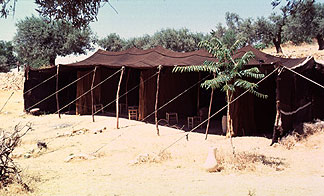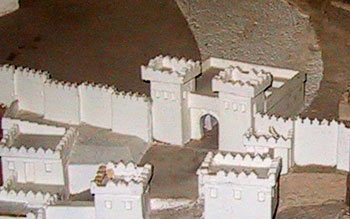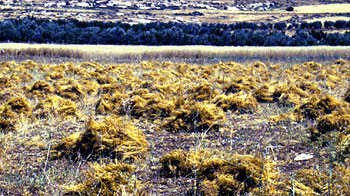Job 4-5
A Bible study with Jeffrey J. Harrison
Last time we saw the miserable condition to which Job was reduced by the attack of Satan. He was now a penniless, homeless leper, living a hellish life in the garbage dump of his village, cut off from the contacts and friendships of ordinary human life. When Job’s friends came to see him, from places long associated with the wisdom of the desert, they sat sheva with him—mourning for seven days—before they could bring themselves to speak. Job, still hanging on to his integrity, refuses to curse or blame God for what has happened. But he does curse the day of his birth, wishing he had never been born. If this is what life is like, he says, what good is it to have been born in the first place? Death, by contrast, is a place of comfort and ease. But here, in this life, he has nothing but misery.
After this pitiable cry of despair, the first of Job’s friends begins to speak: Eliphaz the Temanite. The name Eliphaz
means my God is fine gold,
which was likely intended to imply my God is like fine gold,
although as with all matters poetic, we must be on the alert for intentional hidden meanings. On the other hand, Job, as we saw, can mean Where is my father?
, a good description of Job’s state of mind: in other words, Where is God?
Or it might mean hated
or despised,
which is certainly how Job appeared to others: hated and despised by God.
Eliphaz’s First Speech
Job 4:1: “And Eliphaz the Temanite answered and said,
4:2: ‘Should one try a word with you, will you become impatient? Yet who is able to restrain his speech?’”
Eliphaz begins politely enough, in recognition of Job’s distraught state. As we might put it today, Would you mind if I say something...
But he quickly reveals his impatience with Job’s lament: But how can I not respond to what you’ve said?
4:3: “‘Look, you* have disciplined many and made feeble hands strong.
4:4: The one stumbling your* words have built up, and sagging knees you* have made firm.’”
Eliphaz acknowledges Job’s spiritual leadership in the past. The words used here indicate not medical, but spiritual help, as in Heb. 12:12: Strengthen the hands that hang down, and the knees that are feeble.
Job has been an encouragement and a help to many people.
4:5: “‘For now it comes to you*, and you are impatient; it touches [or strikes] you*, and you* are dismayed.’”
What has come to Job? Suffering. In other words, Eliphaz says, You helped others in their distress, but now when you’re afflicted, you’re upset, and want to die. Listen to your own advice!
4:6: “‘Isn’t your* fear [of God] your confidence, your* hope, and the blamelessness of your ways?’”
Isn’t our fear—that is, our fear of doing something wrong—the source of our confidence and hope for the future? This might be something Job himself had once said that Eliphaz is now repeating to him. It’s a basic religious assertion. As the Bible says elsewhere, the beginning of wisdom is the fear of the Lord. But Eliphaz seems to think that Job has thrown away his fear of God by speaking honestly about his feelings. The deeper implication of his words is that there must have been something lacking in Job’s fear of God to begin with that got him into this mess. Yet we know that Job’s very remarkable fear of God, not his lack of it, is what got him into this situation!
Trouble Comes From Sin
4:7: “‘Remember now, who being innocent has ever perished, and where were the righteous destroyed?’”
Does God destroy the righteous or the innocent? This is similar to Psa. 37:25: I have been young, and now I am old; yet I have not seen the righteous forsaken, or his descendants begging bread.
The idea that only the wicked suffer is a familiar religious assertion, yet one that the book of Job was written to challenge. With this statement, Eliphaz’s hidden meaning in the previous verse is made clear: there must be sin in Job’s life.
4:8: “‘According to what I have seen, those that plow wickedness and sow trouble reap it.
4:9: By the breath of Eloah they perish, and by the wind [or spirit] of his anger they come to an end.’”
Calamities like Job’s don’t just happen. Bad things come as a result of sin. You reap what you sow. Here is Eliphaz’s understanding of Job’s situation: something bad happened to Job, therefore there must be sin in Job’s life, straight and simple. This is a popular religious view now as then. Yet as we know, it was Job’s remarkable blamelessness that got him into this situation.
4:10: “‘The roaring of a lion (aryeh) and the voice of a fierce lion (shachal) and the teeth of the kephirim [often translated young lions,
though the LXX translates it dragons
] are broken.

4:11: A lion (layish) perishes from lack of prey, and the sons of a lioness (lavi) are separated.’”
These two verses are tricky to translate because of uncertainty over the meaning of the words. Of the many Hebrew words commonly translated lion,
some most likely refer to other aggressive species, or species that may now be extinct. Kephirim is a prime example of this (see our teaching on Dinosaurs in the Bible). The Septuagint (LXX) translators interpret kephirim here as dragons.
In any case, both verses assert God’s authority over dangerous animals, and by extension over the wicked. They imply that in Job’s situation, too, there must have been some wickedness that has brought about all his troubles.
The Septuagint adds an additional phrase to the beginning of vs. 12 that is lacking in the Hebrew text (MT): But if there was any true saying among your words, these bad things would not have happened to you.
In other words, if you were truly innocent, Job, as you claim, these things would never have happened to you. This is a good summary of Eliphaz’s point of view.
A Ghostly Vision
4:12: “‘Now to me a word was stolen away, and my ear caught a whisper from it.
4:13: Among disquieting thoughts from the visions of the night, when deep sleep falls on men,
4:14: Fear and trembling came on me, and all my bones were filled with dread.
4:15: And a spirit passed over my face; the hair on my skin stood up.’”
Or as we would put it, the hair stood up on the back of my neck.
4:16: “‘It stood there yet I could not observe its appearance; a likeness before my eyes, a whisper and a voice I hear:’”
In any other context this would be called a ghost story. Eliphaz is bringing in a personal spiritual experience to make his case. Now this phantom of the night speaks:
4:17: “‘“Is man (enosh) more righteous than Eloah? Than his Maker is a man (gever) more pure?
4:18: See, in his servants he does not trust, and to his messengers [or angels] he attributes error.”’”
Servants and angelic messengers are in a synonymous parallel here, so the servants referred to are apparently angels, presumably like the one that spoke to Eliphaz. The error of the angels may be an allusion to the rebellion in heaven of Gen. 6:2-4.
4:19: “‘“Yes, those who dwell in houses of clay, whose foundation is in the dust, they crush them before the moth.”’”

Clay and dust (aphar) are an allusion to the creation of man in Gen 2:7 from the dust (aphar) of the ground, and to the inherent mortality of our physical bodies. The moth can readily be crushed; so too a human life. We can see this type of cruel disregard for humanity in our world even today. In the time of Job, it may reflect the frequent wars and tribal conflicts of what archeologists call the Middle Bronze Age, with its massive city walls built to defend lives and families: a good reason to seek out the solitude of the desert.
If God does not trust eternal angels, the phantom says, how much less those who are made from clay, whose lives are so easily snuffed out.
4:20: “‘“From morning to evening they are broken in pieces; without anyone noticing they perish forever.”’”
People die (or are killed) every day, and nobody pays much attention. This Eliphaz takes as evidence that people are not very important.

4:21: “‘“Is not their [tent] cord pulled up within them? They die, and without wisdom.”’”
Our bodies are often compared in the Bible to a tent—a temporary structure that can be taken down in moment. 2 Cor. 5:1, for example, speaks of the tent of this body.
The pulling up
of one’s tent cord is therefore a symbol of death.
Eliphaz’s ghostly visitor is quoted to put Job in his place. If even the eternal angels are impure in God’s sight, how can mortal man be pure? So Job is foolish to maintain his innocence before God.
Eliphaz Curses the Foolish
Eliphaz continues in his own words:
5:1: “‘Call now, is there anyone that answers you? And to which of the holy ones will you turn?’”
If you are right, Job, and are as innocent as you claim, then where is your divine help? Why isn’t anyone in heaven paying attention to you?
5:2: “‘For anger kills the foolish, and zeal kills the simple.’”
Getting upset about your situation will only lead you into worse trouble.
5:3: “‘I saw the foolish taking root, and I cursed his dwelling in an instant.’”
This is what Eliphaz considers an appropriate response to foolishness. In Hebrew, the word foolish
here is not an innocent fool, someone who just doesn’t know any better, but rather someone who rejects what is right and despises wisdom and morality: a morally wicked person. This is the same sense in which the word fool
is often used in Proverbs: one who rejects God’s way for his own.

5:4: “‘May his sons be far from salvation (yesha), and may they be crushed in the gate [that is, in their legal dealings] and there be no one to rescue them,’”
Here we hear the actual words of Eliphaz’s curse of the foolish: a category in which Eliphaz includes Job, or at least is warning he will end up if he’s not careful.
The gate in the walled cities of ancient times was the natural place for the elders of the city to gather. Here a cool breeze would often blow in the late afternoon, when the houses were still hot from the heat of the day. The gate was essentially a small building built into the wall with an inner and an outer set of doors that were kept open in the daytime. Inside were several small chambers with a step-like bench built around against the inner walls: the perfect place to sit for an impromptu meeting or formal court hearing. As a result, the gate was the place of judgment in a community, and appears in that role throughout the Bible.
Eliphaz wants the family of the foolish (or should we say the wicked) to have no one to help them, no friends in high places to help in the courts. Eliphaz’s attitude is similar to what we see in the Dead Sea Scrolls community in the time of Jesus. They thought that their religious duty was to separate themselves completely from the wicked: to have nothing to do with them and to despise them. This might be what Jesus meant when he said, You have heard that it was said...you will hate your enemy...
But this was an attitude he disagreed with: but I say to you, love your enemies...
(Matt. 5:43-44).

5:5: “‘Whose harvest may the hungry eat and take it even out of the thorns; and a snare pant after their wealth.’”
Thorns are the natural groundcover (the weeds) in Israel and surrounding areas. For the hungry to eat the foolish man’s harvest, even picking the grains out from among the thorns, means that he is left with nothing to eat. Eliphaz also wants there to be a snare of one kind or another waiting anxiously to relieve the foolish man and his family of what they own.
5:6: “‘For affliction doesn’t go out from the dust, and trouble doesn’t sprout from the soil.’”
Trouble doesn’t just happen. It doesn’t spring up on its own.
5:7: “‘For man (adam) is born to trouble, and sparks lift themselves up to fly.‘”
As sparks
(literally sons of a flame
) fly upward, so man is born to trouble. That’s just the way it is. It’s the human condition, which Eliphaz wants Job to admit by confessing the presence of sin in his life.
Eliphaz Tells of God’s Glory
5:8: “‘On the other hand, I myself seek for God (El), and to Elohim I commit my cause’”
Eliphaz recommends to Job that he should turn to God, as he proudly asserts that he himself does, and at the same time implying that Job has not.
5:9: “‘Who does great things and there is no searching them out, wonders until there is no number for them,
5:10: Who provides rain on the surface of the earth and sends water on the surface of the out of doors’”
The natural miracle of rain, water from heaven, is appreciated even more in a land where there is little of it.
5:11: “‘To set those who are low on high; and those who are gloomy are exalted in salvation,’”
The word translated gloomy
here is literally darkened,
as in the darkness of a gathering storm, or the unkempt appearance of mourners. By his miracles, God lifts up the downtrodden, and removes the darkness of sin.
5:12: “‘Who frustrates the plans of the shrewd, and their hands do not acquire success,’”
God foils the schemes of the wicked.
5:13: “‘Who captures the wise in their shrewdness; and the advice of the twisted is hasty.’”
The cleverness of the wicked cannot protect them from God. Nor is their advice based on true wisdom. This verse is quoted with approval in 1 Cor. 3:19.
5:14: “‘By day they encounter darkness and at noon they grope as in the night,’”
Spiritual light is cut off from the foolish.
5:15: “‘And he saves from the sword of their mouth, and the needy from a strong hand.’”
The evil intentions of the foolish are actively opposed by God, who saves people from their verbal and physical attacks.
5:16: “‘And so there is hope for the weak and injustice shuts her mouth.’”
God himself actively opposes the foolish and the wicked, Eliphaz says, and so he considers it right for him to do so, too: that cursing the wicked as he mentioned earlier is simply participating with God in his work. How many thousands have suffered over the years from similar displays of religious pride!
God Will Protect You From Trouble
5:17: “‘Look, blessed is the man (enosh) that Eloah reproves; and do not reject* the discipline of Shaddai’”
Shaddai is an old Hebrew name for God about which there are many opinions. The most probable derivation is from violent one
giving the meaning Almighty,
which is how the Old Greek (the Septuagint) translates it.
This verse is addressed directly to Job himself (do not reject
is in the second person singular command form). Eliphaz feels that Job is rejecting God’s discipline in his life, which God is giving him for his good. But to receive that blessing, he must stop resisting God by claiming his innocence.
5:18: “‘For he causes pain and he binds up, he smites and his hands heal.’”
This is a difficult teaching that finds approval elsewhere in the Bible (Deut. 32:39, 1 Kings 22:23). God is not simply the sugar daddy God of the prosperity movement. David said his rod and staff are a comfort (Psa. 23:4). Why? Because although discipline is sorrowful when we receive it, it later yields the peaceful fruit of righteousness (Heb. 12:11).
5:19: “‘In six troubles he will deliver you* and in seven evil will not touch you*’”
A poetic progression from one number to another is often found in Hebrew proverbs (Pro. 6:16, 30:21; Amos 1:3,6,9, etc.). The meaning is derived not so much from the actual numbers mentioned but from the sense of an increasing series.
Here and in the next few verses, Eliphaz continues to address Job directly (you
in the second person singular [shown as you*
]).
5:20: “‘In famine he will ransom you* from death and in war from the hands of the sword.
5:21: In a scourge of the tongue you* will hide yourself and not fear from violence that it will come to you.
5:22: At violence and hunger you* will laugh, and no [wild] animal of the earth will you* fear.
5:23: For with the stones of the field will your* covenant be, and the [wild] animals of the field will be at peace with you*.’”
Like a stone, nothing will affect you or hurt you: you will be at peace with everything around you.
5:24: “‘And you will know that peace is your* tent, and you will visit your* dwelling and will not sin.’”
You will dwell in peace, and in your dwelling you will not sin. Here the tent appears again as a symbol of human life.
5:25: “‘And you will know that your* seed will be many and your* offspring as the grass of the land.’”
You can be sure that you will have many descendants. (Compare Psa. 92:12-14.)

5:26: “‘You will go in full vigor to the grave as the rising up of a stack of grain in its time.’”
Just as grain is cut in its prime and laid in a stack in the field before being picked up and carried off, so will you go in the prime of life.
5:27: “‘Look at this, we have searched it out, and so it is; pay attention to it and you will know for yourself.’”
Here again Eliphaz appeals to personal experience, in this case not just his own, but that of his tribe. This is the traditional wisdom of his people. If Job heeds it, Eliphaz says, he will see for himself that it is true.
Is Eliphaz Right?
On the surface, a lot of what Eliphaz says has the appearance of true wisdom. Much, although not all of it, is even scriptural. But is he applying it correctly to Job’s situation? Or is he taking these Biblical ideas out of context and twisting their meaning?
By simply observing Job’s external circumstances, it would be easy to come to the conclusion that he was being afflicted for his sin for all the reasons that Eliphaz gives. But looks can be deceiving. We don’t always know why things happen to us or to other people.
In Job’s case, Eliphaz’s words are like rubbing salt into an open wound. Job has trusted in the Lord. He was blameless and upright before God. Yet this promised laundry list of blessings didn’t happen to him; rather just the opposite: all these blessings were taken away from him. So to blame Job for the horrible things that have happened to him, as Eliphaz is doing, is cruel. Yet this is what religious people are tempted to do every day: to blame people for the troubles that come into their lives and criticize them for their supposed lack of faith.
Remember what Jesus’ disciples said when they met the man born blind (John 9:1-3)? Who sinned, this man or his parents, that he was born blind?
(John 9:2). It was so easy for them to connect his disability with sin. But what did Jesus answer? That it was from neither of these causes. The man was born blind in order that the miraculous work of God might be displayed in his life. God had a greater purpose in the man’s difficult circumstances.
Troubles cannot always be attributed to sin. In our own lives, we may sometimes be able to connect the wrong we did with the trouble that followed. But that’s not always the case. Sometimes we get what we don’t deserve: either God’s mercy when we didn’t deserve it, or some kind of suffering or persecution when we didn’t do anything to bring it about. Of course, we would much prefer God’s mercy and blessing all the time. But without obstacles to overcome, there would be no victory, no way to show others, as Jesus did, that God’s love is greater than anything we encounter in this world: greater even than death on a cross.

